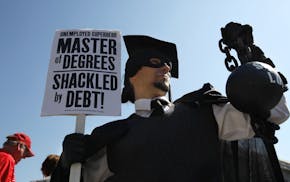"Everything is different."
We heard those words often in the hours and days after Sept. 11, 2001, and in at least one respect they have proven more true than any of us would have liked.
Economically, the U.S. feels much less secure than it did in the months and years before the attacks.
We've experienced two recessions, including the deepest one since the Great Depression, and seem to be flirting with a third. About 5 million manufacturing jobs have disappeared since 2001, and unemployment is stuck at almost twice what it was before the terrorist attacks. U.S. households remain deeply in debt, and plunging home values have withered or wiped out the net worth of America's middle class.
In the 10 years before 9/11, the Dow Jones averaged an annual return of almost 17 percent. In the 10 years since, that average annual return has been under 6 percent.
Meanwhile, the U.S. government itself owes three times more than it did in 2001. America's credit rating has been cut because lawmakers have been unwilling or unable to address the fact that two cherished government safety nets, Medicare and Social Security, now consume almost half of all federal spending and, absent reform, threaten to bankrupt us in the future.
Some of these trends, such as soaring medical costs, existed prior to 9/11. Some, such as the exporting of U.S. manufacturing jobs, were made worse by the economic conditions created by the attacks themselves. Others were the direct or indirect consequences of spending and policy decisions made in response to those attacks.
Contrary to what most of us probably remember, the attacks did not plunge the U.S. economy into recession. Unemployment, which had spent more than half of 2000 at or below 4 percent, was already beginning to rise when President George W. Bush was sworn into office in January 2001. In March of that year (though it wouldn't be declared until many months later), the U.S. officially entered a recession that would last a relatively brief eight months.
But things sure felt worse. It would be four years before the unemployment rate returned to the pre-9/11 level, and for the airline industry, things were never the same. Six North American carriers went bankrupt in the four years after 9/11, including Northwest Airlines. In the last decade, the industry has shed nearly 25 percent of its workforce, or 135,000 high-paying jobs.
The stock market and consumer confidence plunged in the days following 9/11, and policymakers responded with measures that would have unforeseen long-term consequences.
The Federal Reserve, which had been raising interest rates throughout 2000, began trimming them in the wake of the dot-com job losses. After 9/11, the Fed lowered interest rates four times before year end, to 1.75 percent. By 2003 rates were at a 50-year low of 1 percent.
The financial industry responded with an array of increasingly exotic financial products marketed to Main Street and bundled and re-sold across the world. Lulled by the inflated values of our homes and the easy availability of credit, Americans took on record levels of debt. We literally mortgaged our futures.
We know how that ended, and the consequences have proven to be a much bigger drag on the economy than the dot-com meltdown of 2000. Adjusted for inflation, the median sale price for a new home is unchanged from a decade ago. More than a quarter of all American homeowners owe more than the property is worth, making it harder for them to refinance, and are more interested in saving than spending. And weak consumer demand for their products is the main reason companies are reluctant to make new hires.
Finally, there was the cost of fighting the war on terror itself.
A Congressional Research Service report puts the direct price tag of military interventions in Afghanistan and Iraq at $1.3 trillion during the last decade. Breathtaking though this total may be, it does not include domestic appropriations for other national, regional and local security initiatives, such as Homeland Security, which some have estimated at an additional $2 trillion or more.
That's a lot of money, much of which we borrowed.
In a way, we didn't have a choice. President Bush, trying to stave off a recession, cut taxes once in March 2001, and again in May of 2003. Those tax cuts cost the U.S. Treasury an estimated $1.3 trillion in lost revenue over 10 years (Those tax breaks were recently extended by President Obama).
After 9/11, the federal government's annual budget surpluses became deficits, and the total federal debt outstanding almost doubled, to $10 trillion by 2008. Today it's almost $15 trillion.
War is always expensive, and the decision to wage one is driven by political and security considerations. But wars have economic consequences, too, and the cost of 9/11 may be with us for years to come.
ericw@startribune.com • 612-673-1736

Wieffering: Time to get over debit card fees
For Thrivent and others, warnings were there

With billions in sales, some co-ops are big business
